
Careers
- Details
During stressful periods at work, it can be hard to be more than just reactive. Using a technique called mindfulness can make a big difference, says Jackie Hawken
“Wherever you go, there you are” – Jon Kabat-Zinn
The in-box of life never empties. Finding a real work-life balance is about making proactive choices, instead of reacting to external events. It is important to find a way to slow down and consider your options. Do not allow adrenaline and cortisol – both of which have a detrimental impact on our bodies – to become your drugs of choice.
Stress arises when the pressures placed upon you exceed your perceived capacity to cope. It is something that we all experience with the many demands and responsibilities of home and work. Stress can be defined as an intense emotional and physiological reaction to a situation or the mental representation of a situation as a memory or anticipation.
The sustained physiological effects of chronic stress can have a serious effect on the body and lead to an increased risk of disease. The psychological effects of chronic stress produce fatigue, poor concentration and an impaired ability to perform tasks, which leads to more stress. Chronic stress also reduces our listening and communication skills and the quality of our different relationships.
Any activity done mindfully is a form of meditation, and mindfulness is possible practically all the time: it does not always require sitting or necessarily focusing on the breath (although this can be useful – see later), but rather simply realizing what is happening in the present moment, including noticing the mind's usual "commentary". We can be mindful of the sensations in our bodies while walking and become aware “now I am putting down my right foot, now my left”.
It is important to be mindful of the mind's commentary: "I wish I didn't have to do this task, I would rather be somewhere else...”. etc. Once we identify our experience as mental content, we can chose to stop identifying with our perceptions and judgments.
Mindfulness is a proven way to look after ourselves. It is an integral part of Buddhist meditation practices but does not require converting to Buddhism. How we relate to our emotions is important: if we investigate anger with mindfulness, we begin to see that a mixture of feelings, images, memories and sensations creates an emotion: for example we can see that anger can be broken down into feelings of sadness, emptiness and fear.
Mindfulness is moment-by-moment awareness, a skill that teaches us to be less reactive to the experiences of our life and a practice that creates intentional awareness in the present moment.
In the business environment, the most common reason why people begin a meditation practice is related to the need to calm down and organise a space and time of stillness. Mindfulness is a skill that teaches us to be less reactive, to create ‘intentional awareness’ and to pay attention to our lives.
We can practice mindfulness when we walk, eat, experience our emotions and meditate, and in the following ways at work:
Communication
Know what you want to communicate, anticipate the other person’s reaction to your message. Be aware that there are many different ways of asking questions (open, closed, funnel, probing, leading, and rhetorical). Listen actively and allow other people to speak, without interrupting. Build rapport by using polite, positive and persuasive language and by using the word ‘and’ rather than ‘but’ and ‘do remember’ rather than ‘don’t forget’. Words are energy and they can heal or wound yourself and others. Each of us can transform our lives when we learn to speak mindfully – to be aware of what is coming out of our mouths, rather than just say the first thing that comes into our head
Breathing
Your breath is your anchor. When we live our hurried lives we breath shallow and quickly. When we rush, we don’t breathe deeply into our lungs and fill them with air. We must have oxygen to feed our brain, our vital organs and our body. Shallow breathing can lead to stressful states. Learn to become mindful of your breath by using the ‘mindful 3 breaths’: breathe in and out three times, concentrating only on your breathing and nothing else. This takes less than half a minute and can be used at any time, whether sat in your office, behind the wheel of your car or walking at lunchtimes.
Follow this link for instructions on a short meditation practice:
http://www.equanalta.co.uk/de-stressing-techniques/meditation/
Jackie Hawken runs Equanalta, which provides coaching and workshops for lawyers and staff working in local government. See www.equanalta.co.uk
- Details
In these tough economic conditions, and with unprecedented levels of competition for jobs, it is essential for your application to stand out. Kaye Thumpston explains how to get the basics right and really impress at interview.
The key to an organised and successful job search is to view it as a project, appointing yourself as project manager. This will require effort, time and commitment.
Small, seemingly insignificant tasks such as creating a job search file to keep accurate records of the roles you have applied for, as well as relevant contacts and closing dates, allow you to organise your time more efficiently and to prioritise the most important applications. Targeted and tailored approaches take more time to complete, but will immediately jump to the top of a pile of applications, as they will be the most relevant to the organisation and more closely matched to the job specification than other more generic applications.
Using a reputable recruiting company can reduce some of your workload; not only providing you with a pathway to more job opportunities, but also a mine of useful information. Ensure you receive information on the prospective employer’s team, the culture of their organisation and the personalities of the interviewers, which will assist you in your preparation.
Getting the best out of the relationship means ensuring regular (bi-weekly) contact and developing an honest and frank dialogue. Good quality information from an experienced recruiting consultant can really give you the upper hand in an application process.
Getting your CV or application into shape
Our top 5 tips for preparing your CV or application form:
- Keep your CV succinct but do not sell yourself short – include at least four to five bullet points on each of your roles detailing your experience.
- Create a tailored application for each role, ensuring it is relevant to the role and covers the requirements of the job or person specification. “Ensure that you cater your application precisely towards the personal specification, that's why we write them,” advises Sach Bhatia, Principal Solicitor at Homes for Islington. “Clearly state how you meet the specification and provide brief examples. This is the basis we score/shortlist on. Be prepared to expand on these examples in interview."
- Use reverse chronological ordering to ensure your most recent experience is brought to the reader’s attention first.
- Be honest: embellishments on your CV will come back to haunt you. Remember to keep your CV as concise as possible and to use the space wisely.
- Don’t apply for too many roles. This is a time-consuming and demanding process, so take care not to dilute your efforts.
Remember that your CV is a sales document – do not be shy about highlighting your achievements, and be sure to include details of pieces of work, cases or projects that you are particularly proud of.
As Dave McCullogh, Principal Solicitor at Sefton Borough Council, explains: “The most important thing on a CV to me is a clear and concise account of the skills and knowledge of a candidate, backed up with real time examples of cases and perhaps referees who can vouch for the success of the outcome". Not only will this bring your experience to life, but also it will provide a good talking point for the interview.
Impressing at interview
Our top 5 interview tips:
- Research the organisation thoroughly. Interviewers will expect you to know as much as possible about them to demonstrate your genuine interest in the role. This will also enable you to ask intelligent, informed questions, therefore gaining more from the process. Eleanor Hoggart, Assistant Director of Legal Services at Legal Services Lincolnshire, looks for that something extra beyond legal knowledge: “What I am looking for from a candidate at interview is evidence that they are the right 'fit' for the organisation – not just in their legal expertise but their client awareness and their understanding of what councils want and need from a legal service”.
- Find out as much as you can about the interviewer and the team. Utilise your recruitment consultant, contacts in the marketplace, information on the organisation’s website and recent press coverage of the organisation.
- Know your CV inside out. This will allow you to anticipate their questions and to ensure you give a consistent account of yourself.
- Adjust your preparation dependent on the style of the interview. For example, competency-based interviews will require a different approach to a standard interview based on your CV, and you may be required to prepare for a written assessment in some cases.
- Study the job specification and keep focused on the attributes required.
Reliability is key for locums
Whilst most of this advice is also applicable to locum recruitment, there is a definite shift of focus on the part of the employer. Transferable skills are less important, giving way to the need for someone with the necessary skills to ‘hit the ground running’.
Stewart Consterdine, Practise Manager at Cumbria County Council, comments: "When recruiting a locum we normally look for CVs which demonstrate vast experience gained in the exact same working environments. The purpose of recruiting a locum is that they will be able to come in and pick up a caseload with minimal supervision so references from previous clients which comment on this are a big deciding factor.”
Demonstrating your reliability is paramount when being considered for a locum opportunity – ability alone is not sufficient.
Take the chance to widen your network
Networking can also be an immensely rewarding and productive use of your time when searching for a new job. As well as speaking with people you already know, get involved with groups such as your local branch of Solicitors in Local Government. Look out for specific speed-networking events, or special interest groups for your area of law. You may even pick up some CPD points along the way.
In summary, take your time with applications and give each role and application thorough consideration. Take pride in the CV or application forms you complete, as these will inform the employer’s first impression of you, and will ultimately determine whether you are invited to take part in the interview process.
Kaye Thumpston is a consultant with Hays Legal.
- Details
The range of ways in which local authority lawyers can get involved in pro bono activities is wider than you think, says LawWorks’ Rebecca Hilsenrath.
It is November: shop windows now feature Christmas card displays and newspaper columns speculate on how the retailers will fare in a December which will end one of the hardest financial years in British history. Not many have thrived over the past twelve months, other than insolvency practitioners, and few in the legal profession particularly will be sorry to say goodbye to 2009 on 31 December. It has been a long, hard year with many redundancies and those remaining in employment are faced with significant work pressures and demoralized working environments.
Local authority lawyers work in-house and are insured only for legal advice and assistance provided to their client. Even if they were to overcome that obstacle to provide help to private clients, they would be faced with inevitable conflicts of interest.
The link between these two paragraphs, which might at first seem unconnected, is that they could appear to constitute, together, an insuperable range of good reasons why it is absurd in the current climate to ask local authority lawyers to work pro bono.
In fact, of course, the absolute opposite is the case. Anyone can do pro bono, irrespective of status of employment, area of expertise, physical location or professional seniority. Moreover, the case for doing pro bono increases in hard times.
A changed landscape
Over the past decade, pro bono in England and Wales has transformed itself and, to some extent, has begun to transform the legal profession.
Pro bono recognises that many lawyers went into law to help people and allows them to access a sense of motivation, satisfaction and pride which is quite separate from (and may be elusive in connection with) the day job. Pro bono also nudges lawyers away from an increasing tendency towards over-specialisation, which is responsible for putting caution before broader professional development.
Advising pro bono clients provides lawyers with the chance to broaden their comfort zones and learn to advise across a wider range of areas. In that sense, it helps in developing skills which are key to the legal profession. Pro bono volunteers learn valuable skills, including how to communicate with people from a number of different backgrounds. Pro bono is a free approach to essential learning and development as well as an important factor in the morale and culture of legal teams.
A time of opportunity
The current economy is not a threat to pro bono but the opposite. Pro bono work increases access to justice for a rising tide of those in need of support in debt, housing and social welfare areas of law. It will result in a vastly more motivated profession that marshals its resources to help those hardest hit by the recession.
LawWorks is the operating name of the Solicitors Pro Bono Group. Established in 1997, we are a national charity providing brokerage, consultancy and clearinghouse services for lawyers providing legal advice and assistance without charge.
We operate through a number of specific projects: we establish and support law clinics; we broker casework for individuals, charities and social enterprises; we run a free mediation service; we run legal training sessions for community groups and we work with law schools to develop pro bono programmes for students. All our members are entitled to free CPD training in relevant areas of social welfare law (which will soon be available over the internet) and recognition through our annual awards.
Some of the opportunities we provide are face to face; some are on-line; some require the briefest of answers, others involve a longer commitment; but all can make a real and tangible difference to an individual or community group in need.
In all areas, we work as closely as possible in partnership with other organizations such as the Bar Pro Bono Unit and the ILEX Pro Bono Forum. We believe strongly in collaboration and coordination – it is these themes that have so reformed and strengthened the modern pro bono sector in England and Wales.
Among its 100+ members, LawWorks boasts an increasing number of in-house legal teams – including, of course, the Government Legal Service, and has recently begun conversations with the Crown Prosecution Service and Solicitors in Local Government.
Local government lawyers and pro bono
We believe we have a lot to offer solicitors in local government. We also believe they have an immensely important role to play in pro bono as a regional network of lawyers covering the whole of England and Wales.
LawWorks has developed a specialization in working with in-house groups. All the benefits of membership referred to above are available to these members, and we provide help and advice in setting up pro bono programmes which include suitable pro bono opportunities for in-house members.
We can help with professional indemnity insurance and Law Society dispensation for in-house lawyers, and our links with the voluntary sector will help lawyers to assist people and organisations most in need.
In particular, local authority lawyers can use pro bono projects to develop teamwork skills and networking links not only with other in-house teams involved in pro bono but also with their own panel firms. Importantly, it will also help them to develop relationships and stakeholder networks in the communities they serve.
Lastly, it is a great mistake to dismiss pro bono for local authority lawyers as being prohibited on the grounds of conflict of interest. For a start, our Community Groups casework is non-contentious and ideal for in-house lawyers who are able to use their professional expertise to assist small charities and community groups in areas such as employment and landlord and tenant issues.
Further, our Initial Electronic Advice (IEA) project provides anonymous advice where no client relationship is formed at all. IEA is an automated web-based system which provides short, initial legal advice in response to relatively straightforward questions.
Educational opportunities
An important part of what we do does not involve direct legal advice at all, but comprises public legal education initiatives – raising awareness of legal rights and responsibilities before problems arise. This work stream should be of particular interest to local authority lawyers in helping to anticipate the legal problems which they would otherwise have to resolve in their localities.
Through our members, we provide practical advice talks on relevant areas of law (for example data protection, corporate structure and employment) for community groups. We also provide factsheets with background legal information about a specific area of law which are then downloaded from our websites. Any member lawyers who have specific expertise in an area of use to community groups can draft a factsheet that charities can use as a reference guide. Indeed, our CPD training programme itself relies on volunteer trainers who are able to assist in areas such as debt and social welfare law, where local authority lawyers are often expert.
A recent LawWorks project, ALLIES (“a local lawyer in every school”) promotes and supports lawyers serving as school governors. This must include many local authority governors who, through our on-line forum, could be put in touch with others in that special interest group to swap best practice and offer mutual support and learning.
Further information on all of these options can be found at www.lawworks.org.uk.
Linking up with the SLG
LawWorks has recently developed contacts with the Solicitots in Local Government group (SLG). We are very keen to see this develop into more effective and joined up pro bono contributions from the local authority sector.
The current chair of SLG, Guy Goodman, is particularly keen to promote involvement with pro bono work, and comments: “Corporate Social Responsibility is an issue that has not really been on the local government lawyer radar, but it is time that we woke up to the fact that we can make a real positive contribution – particularly in the field of public legal education. It is time to get involved.”
However, it would be a mistake to believe that pro bono delivery by solicitors in local authorities is mere aspiration. It is already a reality.
Take Adrian Schwab of Buckinghamshire County Council, who really does go the extra mile for pro bono. Adrian coordinates a drop in clinic in Edmonton to which he drives every Wednesday from Aylesbury, where he lives and works. This constitutes a 110-mile round trip.
Following the closure of Enfield Law Centre, the Enfield Evening Advice Service was re-opened in February 2009 thanks to the support of OJN Solicitors. It operates at Enfield Foyer in Edmonton. Four advisers from local firms attend each clinic under Adrian’s supervision, seeing up to 20 clients each week on a drop-in basis.
The clinic covers most areas of law, with a focus on housing, welfare benefits, employment, small claims, immigration and family. As well as providing initial advice, volunteers write follow-up letters and provide a list of referral specialists.
Adrian says the only problem is the number of clients they are faced with. Because the clinic is located in Enfield, there is a large volume of unmet legal need and no question that the clinic is making a real difference. “I believe that Enfield Advice Service is about helping and supporting the most vulnerable members of our society, when they need it most,” Adrian adds.
We regard Adrian as a local hero (especially because, in addition to Enfield Advice Service, he is in the process of becoming a school governor through the ALLIES initiative). His commitment stands out but he is not the only one.
The truth is that while the business case for pro bono is easily made, the moral case should not be overlooked, nor the contributions of people like Adrian which stand as testament to their belief in access to justice.
I myself believe that many of our members act in that genuine belief. Winston Churchill said “We make a living by what we get; we make a life by what we give”. It is important – for those of us who make our living out of law – to remember that.
Happy New Year. Let us hope we can all work together to make it a better one.
Rebecca Hilsenrath is chief executive of LawWorks
- Details
Local Government Lawyer puts Simon Aley, head of legal and democratic services at Corby Borough Council, under the spotlight.
1. When and why did you decide to become a lawyer?
It was towards the end of my time at Warwick University – after helping run the University Neighbourhood Law Centre when I started to realise that legal practice was a bit more interesting than legal theory! Although even then I wobbled a bit – see answer to 7 below.
2. Have you always worked in local government?
No, although most of my career has been in local government. I have worked for 11 different councils and at five of those as head of legal. But I had a brief stint in private practice in London first, have worked for a charity supporting volunteers and had my own practice.
3. What has been your proudest moment so far in your local government career?
I guess it has to be Corby becoming the first local authority in the country ever to win a Law Society National Award. We won the LEXCEL Highly Commended Award in 2008.
4. What one piece of legislation affecting local government would you change and why?
Just ONE!! Well I guess it would have to be the Local Government & Housing Act 1989, so that Monitoring Officers had to be legally qualified to solicitor or barrister level. After all I would like to think that a lifeguard can swim when I am in a swimming pool.
5. What major changes do you see to local government legal practice in years to come?
There will continue to be a contraction in the number of legal practices in local government as a result of local government reorganisation and partnership working. This could present a real opportunity for far more comprehensive in-house practices, although the evidence so far does not show this is happening significantly.
6. What advice would you give to lawyers who are just about to start a career in local government?
If you came into law to practice law, then this is the place to be. It isn’t a stepping-stone though – it is a career and the opportunity to develop real expertise while working for the community.
7. If you hadn’t become a lawyer, what would you have done?
After leaving University, I worked in a drug rehab home and seriously considered doing that instead as well as looking to work in housing.
8. If you had to recommend one place/attraction in your authority to visit, where would it be and why?
Until this year I would have said Rockingham Village and Castle with its wonderful elephant yew hedge. However, this year Corby opened the first ever 50m public swimming pool in the East Midlands, so it has to be the new Corby Pool!
9. Yes, Minister or The West Wing?
Yes Minister
10. What was the last good book you read?
The Fifth Pillar by David Zeidan
If you would like to be the subject of 10 Questions, email us at
Careers News Article Count: 529
Careers Features Article Count: 142
Page 112 of 112
Head of Governance & University Solicitor
Assistant Director - Legal & Governance
Director of Legal and Governance (Monitoring Officer)
Senior Lawyer - Advocate
Events

 Back to Basics: Construction Insurance and Insolvency - Devonshires
Back to Basics: Construction Insurance and Insolvency - Devonshires
16-07-2025 2:00 pm
Online (live)
 Institutional landlord series: Service and Notices – from Possessions to Injunctions and Requests for Access - 5 Pump Court
Institutional landlord series: Service and Notices – from Possessions to Injunctions and Requests for Access - 5 Pump Court
16-07-2025 4:00 pm
Online (live)
 HMPL Building Blocks: Tackling Non-occupation and Sub-letting - Devonshires
HMPL Building Blocks: Tackling Non-occupation and Sub-letting - Devonshires
17-07-2025
Online (live)
 To establishing whether Material Changes of Use have occurred - Ivy Legal Training
To establishing whether Material Changes of Use have occurred - Ivy Legal Training
18-07-2025 9:30 am
Online (live)
 Business and Property Masterclass #5: Interim Relief – Acting urgently and getting it right - Cornerstone Barristers
Business and Property Masterclass #5: Interim Relief – Acting urgently and getting it right - Cornerstone Barristers
10-09-2025 11:00 am
Online (live)
 Business and Property Masterclass #6: Rights of Light and Restrictive Covenants - Cornerstone Barristers
Business and Property Masterclass #6: Rights of Light and Restrictive Covenants - Cornerstone Barristers
23-09-2025
Online (live)
 HMPL Building Blocks: Service Charges & Ground Rent – Tackling Leasehold and Shared Ownership Arrears - Devonshires
HMPL Building Blocks: Service Charges & Ground Rent – Tackling Leasehold and Shared Ownership Arrears - Devonshires
14-10-2025
Online (live)
 Institutional landlord series: Possession – High Court Enforcement - 5 Pump Court
Institutional landlord series: Possession – High Court Enforcement - 5 Pump Court
22-10-2025 4:00 pm
Online (live)
 Institutional landlord series: Costs Recovery and Legally Aided Parties - 5 Pump Court
Institutional landlord series: Costs Recovery and Legally Aided Parties - 5 Pump Court
05-11-2025 4:00 pm
Online (live)
 HMPL Building Blocks: Law and Procedure Following Death of a Tenant - Devonshires
HMPL Building Blocks: Law and Procedure Following Death of a Tenant - Devonshires
09-12-2025
Online (live)
 HMPL Building Blocks: Legal Tools to Combat Anti-Social Behaviour - Devonshires
HMPL Building Blocks: Legal Tools to Combat Anti-Social Behaviour - Devonshires
17-02-2026
Online (live)


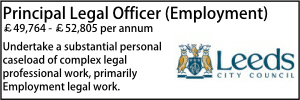



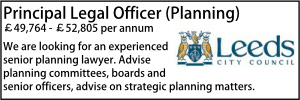

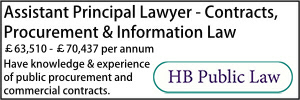

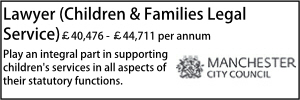




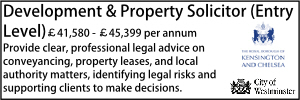




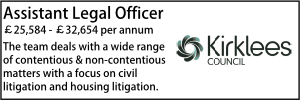





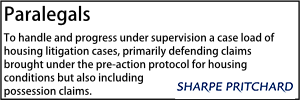

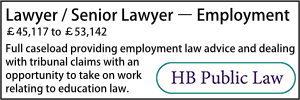
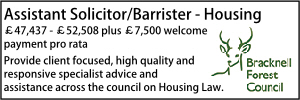
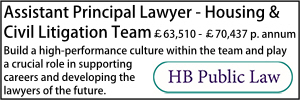



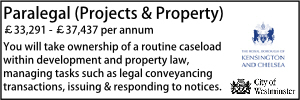







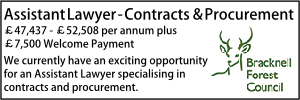






 A-Z Family Law: Take Two! - 42 Bedford Row
A-Z Family Law: Take Two! - 42 Bedford Row  Executive Programme in Public Procurement Law and Policy - University of Nottingham
Executive Programme in Public Procurement Law and Policy - University of Nottingham  Property Law Roadshow 2025 - Bristol - St John's Chambers
Property Law Roadshow 2025 - Bristol - St John's Chambers  CUBAS Comprehensive Training & Licencing (Manchester), September 2025
CUBAS Comprehensive Training & Licencing (Manchester), September 2025  AI in the Public Sector Conference - Westminster Insight
AI in the Public Sector Conference - Westminster Insight  Activism in the Workplace - 42BR Barristers Employment Law Annual Lecture
Activism in the Workplace - 42BR Barristers Employment Law Annual Lecture  DoLS Authoriser Training - LPS Law
DoLS Authoriser Training - LPS Law  Property Law Roadshow 2025 - Cardiff - St John's Chambers
Property Law Roadshow 2025 - Cardiff - St John's Chambers  Annual Fraud Conference 2025 - Oxford Investigation Service
Annual Fraud Conference 2025 - Oxford Investigation Service